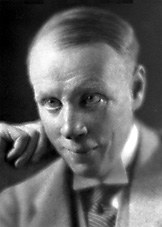February 7: Sinclair Lewis
Sinclair Lewis (1885)
It was on this date, February 7, 1885, that Nobel-winning American novelist Sinclair Lewis was born in Sauk Centre, a prairie village in Minnesota, the son of a country doctor. As a boy he was interested in all religions, but particularly the Roman Catholic Church, yet he taught Protestant Sunday School as a youth and into college. He attended Oberlin Academy in Ohio and, from 1903-1906, Yale University, where he edited the Literary Magazine. In 1906 he spent a month doing odd jobs at Upton Sinclair's utopian community Helicon Hall in New Jersey. He finally graduated Yale in 1908.
It was in college that Lewis lost most of the religion he had, writing as part of his credo, "No cant about Sabbath, & priesthoods & gods, & saints, & blasphemy ... If there be saints — they are Voltaire — as well as Christ; Shelley as well as St. Paul."[1] He at last concluded, "The Christian religion is a crutch. Until it is taken away we can never begin to walk well."[2]
For the next seven years, Lewis worked in New York publishing houses. His first book, Hike and the Aeroplane, a boy's adventure story, was published in 1912. He married Grace Hegger two years later and published his first in a series of social criticism novels, Our Mr. Wren (1914), that same year. Lewis achieved his first major commercial success as a novelist with the publication of Main Street in 1920, the first of many criticisms of the romantic notion of small-town life in the U.S. Lewis was not sparing of religion:
Despite Aunt Bessie's nagging the Kennicotts rarely attended church. The doctor asserted, "Sure, religion is a fine influence — got to have it to keep the lower classes in order ... And I guess this theology is O.K. ..." He believed in the Christian religion, and never thought about it, he believed in the church, and seldom went near it... .
—Main Street, chapter 28
In 1922 he published a lampoon of middle-class values as upheld by George F. Babbitt, an American businessman. Babbitt had his own uses for religion:
[Babbitt's] church, the Chatham Road Presbyterian, was one of the largest and richest... The pastor was the Reverend John Jennison Drew, M.A., D.D., LL.D. ... He was eloquent, efficient, and versatile. He presided at meetings for the denunciation of unions or the elevation of domestic service ... He admitted that he was too much the scholar and poet to imitate the evangelist, Mike Monday, yet he had once awakened his fold to new life, and to larger collections, by the challenge, "My brethren, the real cheap skate is the man who won't lend to the Lord!"—Babbitt, chapter 16
Yet it was his attack on Bible Belt fundamentalist religion, Elmer Gantry (1927 — filmed in 1960), that won Lewis both praise and condemnation. Protestants distanced themselves from the novel by rationalizing it as only a criticism of religious charlatans. Catholics liked Elmer Gantry because it criticized the Protestant heresy. But Catholic moralists had some trouble with the implied sexual relationship between Elmer and Sister Sharon Falconer, so they couldn't recommend it for young readers (or viewers).
It was for Arrowsmith (1925), an exposé of the medical profession, that Lewis won the Nobel Prize for Literature in 1930 — the first American to be so honored. He followed that novel with Dodsworth (1929) and a cautionary tale about fascism conquering America, It Can't Happen Here (1935). His later works failed to find a following among critics or readers. Lewis retired to Italy sometime after his son was killed by a sniper in World War II.
Lewis died in Rome of heart disease on 10 January 1951. His body was transported to Minnesota for burial. It was Sinclair Lewis who said, "It is, I think, an error to believe that there is any need of religion to make life seem worth living."[3]
[1] Mark Schorer, Sinclair Lewis; an American Life, 1961. [2] Ibid. Schorer relates a story about Lewis that caused the novelist some controversy when it was misreported later. On 18 April 1926, Lewis was giving a talk at the Linwood Blvd. Christian Church and answered a critic who wrote to defend the fundamentalist idea of God. Ruth Mary Weeks, who was on the platform with Lewis, narrated the incident in a 1953 letter. "God is not like that," Weeks recalled Lewis saying, "Modern man does not so picture Him. If there were such a deity... he would certainly strike me dead for what I am about to say in the next fifteen minutes." After a bit, Weeks says, Lewis paused and then remarked, "Well, the fifteen minutes are up. I am still alive, and the writer is wrong. God is not as he pictures Him." [3] Quoted in Will Durant, On the Meaning of Life, 1932, p. 37.
Originally published February 2004 by Ronald Bruce Meyer.


